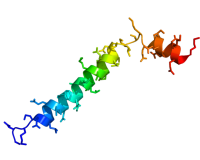Whether you’re a bodybuilder or just looking to increase muscle mass, peptides can help optimize muscle growth and help you reach your goals faster.
These precious amino acids are the building blocks of proteins. They have many uses, including treating disease, reducing inflammation, destroying microbes, and even reversing aging. Which peptides are best for muscle growth? Isn’t it?
What Are Bodybuilding Peptides?
The term “peptide” refers to any molecule consisting of 2 to 50 amino acids chemically linked by peptide bonds.
Peptides occur naturally in the human body and in animal and plant protein sources such as meat, fish, eggs, dairy, milk, soy, oats, beans, and lentils. These are also produced artificially.
When people refer to “bodybuilding peptides,” they are usually referring to powdered or injectable peptides used to stimulate the secretion of human growth hormone (HGH), also known as growth hormone secretagogue (GHS).
What do peptides do in your body?
Because the structure of peptides may resemble that of certain hormones and messenger compounds in the body, they interact to activate various receptors throughout the body, thereby affecting various bodily processes.
Based on their structure and composition, some peptides help prevent blood clots, protect cells from damage, boost the immune system, and lower cholesterol, inflammation, and blood pressure.
Certain peptides also help increase the release of hormones that stimulate muscle growth, body fat loss, and athletic performance and recovery. It is especially attractive to bodybuilders.
Muscle Building Peptides
Here we discussed some peptides that can help you build muscle. Each of these peptides has its own tearing mechanism. Now let’s learn about some of the best supplements for deciding which peptide is best for your muscle-building program.
CJC 1295 and Ipamorelin
As we age, we lose the ability to produce important growth hormones. In fact, by age 30, it drops 15% every 10 years. However, combining CJC 1295 and Ipamorelin can help you gain lean muscle mass and greater strength than alone. You would see results within the first few weeks of taking it.
Not only will you improve muscle and strength, but you’ll improve recovery time and stimulate muscle growth. These two seem to do the same thing, but they affect two different fields. CJC 1295 binds to GHRH, and ipamorelin binds to the ghrelin receptor. Both produce more growth hormone by default, increasing your chances of building muscle.
IGF DES
IGF DES has functions related to hyperplasia, the enlargement of organs and tissues caused by increased cell production. Its synthetic variant promotes faster cell repair and wound healing. Since it works when and where it is needed, you can expect muscle growth at the injection site. Building muscle has never been easier with this peptide.
TB-500
TB-500 is also known as one of the best peptides for muscle growth. TB-500 is a synthetic equivalent of the Thymosin Beta-4 amino acid that acts by modulating aggregation. Because of this, it has the potential to heal acute injuries from which recovery is often slow after symptoms appear.
Also, there is word of mouth in favor of using the TB 500 to stimulate muscle growth. First, Thymosin increases cellular respiration. This is beneficial not only during physical activity but also during the recovery phase.
Second, amino acids increase red blood cells, improving the absorption and delivery of oxygen to muscles. As a result, recovery time between workouts is improved, and the protein also promotes new muscle growth.
The natural process of angiogenesis allows you to lose excess weight and build muscle. Luckily, TB-500 effectively stimulates angiogenesis by promoting the proliferation of blood cells in existing blood vessels. Finally, this peptide shows promise in reducing recovery time after injury when repairing tissue and other mobility problems.
Sermorelin
Compared to other peptides in this limited list, Sermorelin is the most potent. Because it has more beneficial effects on the body if used properly. Increased muscle growth is just one example. An increased metabolic rate also helps in fat loss. Sermorelin is one of the peptides used in bodybuilding to help the immune and cardiovascular systems. The body can benefit from this hormone because it rouses growth hormone production.
Creatine peptides
Since creatine is an amino acid stored in muscles, it has many potential benefits when combined with proper training. It’s a popular booster known for maximizing your training. It is bulkier and more popular as an adjuvant.
However, creatine peptides are growing in size and popularity as a training aid because they are believed to be easier to absorb from the gut than other forms of creatine.
Growth Hormone Releasing Peptides (GHRPs) and Hexarelin
Hexarelin acetate is a growth hormone-releasing peptide (GHRP) consisting of 6 amino acids. It is a growth hormone secretagogue.
Increases HGH release, supports cell regeneration, and increases muscle and strength. Some GHRPs, such as GHRP-6, also release appetite-stimulating ghrelin, making them ideal for those who need to increase their calorie intake.
Hexarelin functions like the natural hormone ghrelin. Hexarelin binds to the growth hormone secretagogue receptor (GHSr) in the hippocampus and peripheral organs, triggering the release of growth hormone (GH).
Hexarelin-induced growth hormone (GH) release leads to muscle fiber growth. This builds muscle mass and increases lean muscle mass. You may experience increased physical strength after using Hexarelin.
Conclusion
How far have you come with diet and training? If the answer isn’t what you were expecting, it’s time to boost up your game and try the next best thing: peptide therapy for muscle growth.
We guarantee you will see results in just a few months. At the end of the treatment, you’ll love how it looks and feels.
There is an encouraging sign that certain peptides can change body composition. Still, we don’t yet know how safe they are (and often aren’t even legal, to begin with). Suppose you are interested in using peptides to promote muscle growth. In that case, we recommend you consult your doctor to see if peptide therapy suits you.




